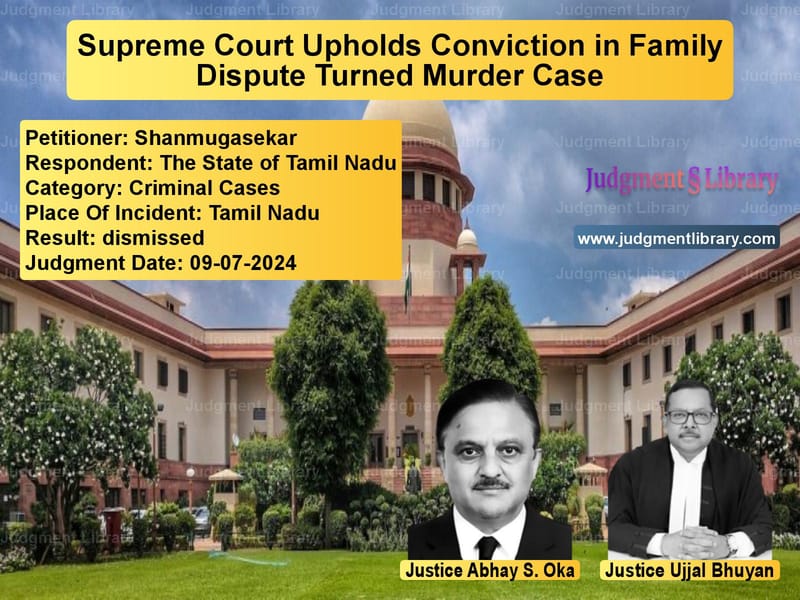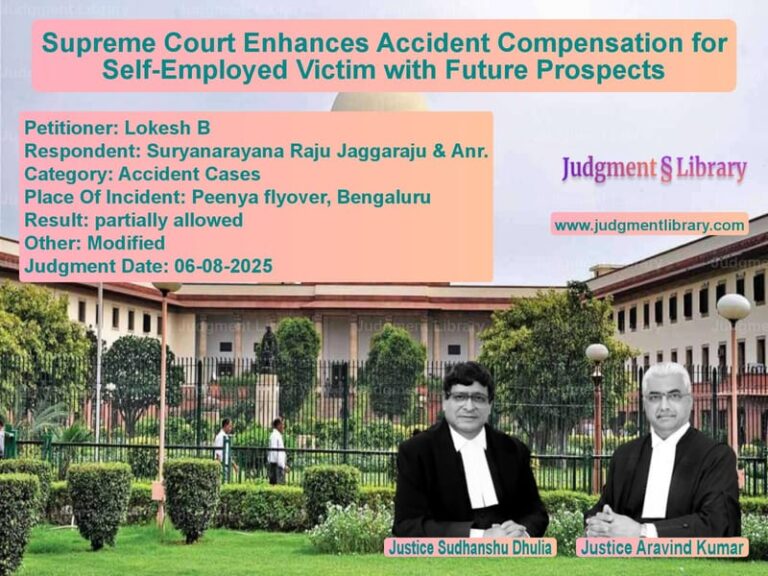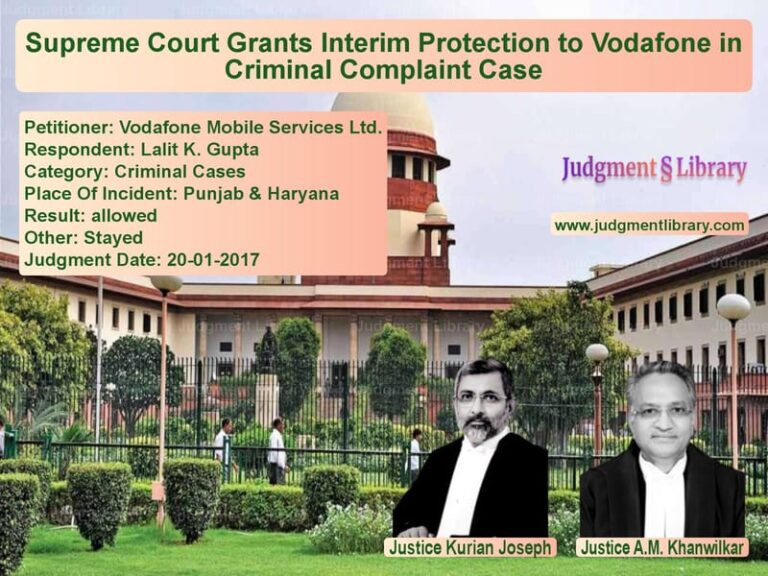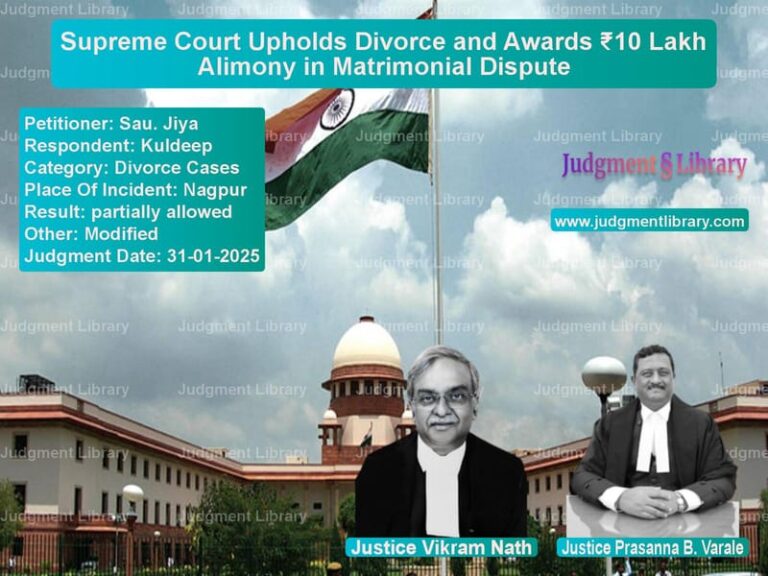Supreme Court Upholds Conviction in Family Dispute Turned Murder Case
The case of Shanmugasekar v. The State of Tamil Nadu involves a tragic sequence of events arising from a domestic dispute that escalated into a fatal assault. The Supreme Court upheld the conviction of the appellant under Section 302 of the Indian Penal Code (IPC), reaffirming the principles of criminal liability in cases involving family altercations that result in murder.
The case stemmed from a confrontation over the payment of an electricity bill, which led to a violent altercation between family members. The appellant, in the heat of the moment, attacked the deceased with a billhook, causing fatal injuries. The lower courts found the appellant guilty, and the Supreme Court confirmed this verdict, dismissing the appeal.
Background of the Case
The appellant, Shanmugasekar, was convicted for the murder of Muthu, his father-in-law, following a heated argument over an unpaid electricity bill. The incident occurred on September 28, 2016, when the appellant and his brother, PW-4 Kesavan, engaged in a dispute regarding the electricity charges for their shared residence. The deceased, along with PW-1 and PW-5, intervened in an attempt to diffuse the situation. However, the altercation escalated when the appellant and his father, accused no. 2 Kaari, retrieved billhooks from their home and attacked Muthu, inflicting severe injuries that led to his death.
Arguments by the Petitioner
The defense counsel argued that:
- The appellant had no prior intention to kill the deceased and that the incident arose from a sudden fight in the heat of passion.
- The altercation was between the appellant and PW-4, and the deceased intervened voluntarily.
- The prosecution failed to prove the case beyond a reasonable doubt, particularly regarding the exact time and sequence of events.
- The injuries inflicted were not sufficient to cause death in the ordinary course of nature.
- The case should fall under Part II of Section 304 IPC (culpable homicide not amounting to murder) rather than Section 302 IPC.
Arguments by the Respondent
The State of Tamil Nadu countered the defense by asserting:
- The appellant and his father retrieved weapons and used them in a premeditated attack, proving intent to cause grievous harm.
- Eyewitness testimonies, including those of PW-1, PW-4, and PW-5, were consistent and credible.
- The injuries inflicted were severe, including a fatal head wound, which directly caused the death of the victim.
- The appellant was the aggressor, and the deceased was merely trying to mediate the conflict.
High Court’s Decision
The High Court upheld the Trial Court’s decision, convicting the appellant under Section 302 IPC. It rejected the defense’s claim that the case fell under Section 304 IPC, noting that the appellant’s act of retrieving a weapon demonstrated a conscious decision to escalate the conflict.
Supreme Court’s Ruling
The Supreme Court affirmed the conviction, stating:
“If there was no intention on the part of the appellant to cause bodily injury to the deceased and other injured witnesses, there was no reason for him to go back to his house and bring the weapon. He brought the billhook from his home, obviously to make an assault.”
The Court further observed that the deceased was not an aggressor but was merely attempting to defuse the situation. The appellant’s actions, therefore, could not be justified under any of the exceptions to Section 300 IPC.
Read also: https://judgmentlibrary.com/kidnapping-for-ransom-supreme-court-acquits-accused-after-21-years/
Legal Precedents Cited
The Court referred to key precedents, including:
- Chilamakur Nagireddy v. State of Andhra Pradesh (1977) – Addressing the elements of intent in homicide cases.
- Virsa Singh v. State of Punjab (1958) – Establishing criteria for determining murder under Section 302 IPC.
Conclusion
The Supreme Court’s decision in Shanmugasekar v. The State of Tamil Nadu underscores the significance of intent and premeditation in homicide cases. The ruling reaffirms that retrieving a weapon to escalate a dispute indicates culpable intent, thereby justifying a conviction under Section 302 IPC.
Petitioner Name: Shanmugasekar.Respondent Name: The State of Tamil Nadu.Judgment By: Justice Abhay S. Oka, Justice Ujjal Bhuyan.Place Of Incident: Tamil Nadu.Judgment Date: 09-07-2024.
Don’t miss out on the full details! Download the complete judgment in PDF format below and gain valuable insights instantly!
Download Judgment: shanmugasekar-vs-the-state-of-tamil-n-supreme-court-of-india-judgment-dated-09-07-2024.pdf
Directly Download Judgment: Directly download this Judgment
See all petitions in Murder Cases
See all petitions in Bail and Anticipatory Bail
See all petitions in Attempt to Murder Cases
See all petitions in Judgment by Abhay S. Oka
See all petitions in Judgment by Ujjal Bhuyan
See all petitions in dismissed
See all petitions in supreme court of India judgments July 2024
See all petitions in 2024 judgments
See all posts in Criminal Cases Category
See all allowed petitions in Criminal Cases Category
See all Dismissed petitions in Criminal Cases Category
See all partially allowed petitions in Criminal Cases Category







